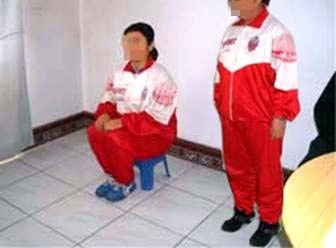(Minghui.org) Authorities at the Beijing Women's Forced Labor Camp escalated their persecution of Falun Gong practitioners between August 2012 and February 2013, just before it was decommissioned.
Labor camp officials moved all practitioners who refused to give up their beliefs to the third floor of a building south of the medical facilities. The first, second, and third group each sent two guards there. There were also guards from the drug-addict group, the security group, and prisoners from the fourth group, which was previously the dispatch center. These prisoners, most of whom had violent tendencies, were monitoring Falun Gong practitioners. Each Falun Gong practitioner was monitored by four prisoners around the clock, even when using the bathroom. The prisoners reported all activity to the guards, even when the practitioner turned in their sleep.
The labor camp used many kinds of torture on practitioners. They forced practitioners to sit on small plastic stools designed for children from 5:00 in the morning until midnight, sometimes even longer. There was little time for sleep.
 Torture re-enactment: Sitting on a small stool
Torture re-enactment: Sitting on a small stool
When a practitioner first arrived, four prisoners surrounded her so tightly that she was unable to move. On the second day, the guards took turns “talking” to the practitioner, targeting her mental weaknesses, trying to brainwash her, and forcing her to write statements promising to give up her belief. They forced practitioners to watch videos slandering Falun Gong, and pressured the families of those practitioners who refused to give up their belief. Threats were used to mentally torture practitioners and their families.
The guards did not allow practitioners to shower or use the bathroom. Infrequently a practitioner was allowed to clean herself with two scoops of water, but she was always humiliated by the prisoners and guards when she did so. Practitioners were not allowed to eat unless they memorized prison regulations, and were even threatened by deputy director Fu Wenqi to be force-fed. Those practitioners who refused to cooperate were punished by being made to stand for long periods of time. Practitioners were not allowed to use the bathroom even during their menstrual periods.
The guards used prisoners to insult practitioners. The prisoners would chop off practitioners' hair in extremely ugly ways, strip-search practitioners twice a day, and continually pressure them to give up their beliefs.
The torture made some some practitioners' buttocks fester. Some became severely ill and extremely thin. This temporary concentration camp was not dismantled until February 2013.
Fu Wenqi was formerly captain of the tenth group of the Beijing Forced Labor Dispatch Center. After the dispatch center closed, she was promoted to deputy director of the Beijing Women's Forced Labor Camp because she actively persecuted Falun Gong practitioners.
When she was in the dispatching center, she fiercely tortured practitioners who refused to convert. She regularly enlisted six-foot tall prisoners and strong drug-addicts to strip Falun Gong practitioners, then hold them to the ground, pinching their noses, pressing on their heads, then forcefully opening their mouths to pour in water. The victims could not breathe, with water being constantly poured down their throats. It felt like drowning.
Fu Wenqi herself forced water into practitioners many times. After she moved to the Beijing Women's Forced Labor Camp, she also threatened to force-feed water to those practitioners who refused to convert.
The labor camp gradually released Falun Gong practitioners between June and August 2013. Right before the labor camp finally closed, some captains asked the practitioners they had tortured not to expose their crimes. These vicious perpetrators expressed fear of being brought to justice.





